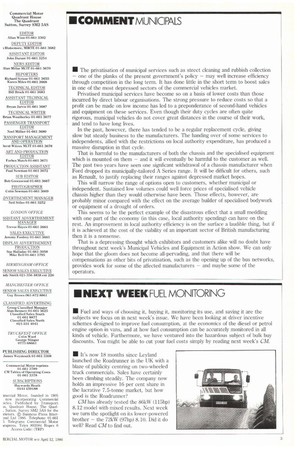IN COMMENT MUNICIPALS
Page 3

If you've noticed an error in this article please click here to report it so we can fix it.
• The privatisation of municipal services such as street cleaning and rubbish collection — one of the planks of the present government's policy — may well increase efficiency through competition in the long term. It has done little in the short term to boost sales in one of the most depressed sectors of the commercial vehicles market.
Privatised municipal services have become so on a basis of lower costs than those incurred by direct labour organisations. The strong pressure to reduce costs so that a profit can be made on low income has led to a preponderance of second-hand vehicles and equipment on these services. Even though their duty cycles are often quite rigorous, municipal vehicles do not cover great distances in the course of their work, and tend to have long lives.
In the past, however, there has tended to be a regular replacement cycle, giving slow but steady business to the manufacturers. The handing over of some services to independents, allied with the restrictions on local authority expenditure, has produced a massive disruption in that cycle.
That is harmful to the manufacturers of both the chassis and the specialised equipment which is mounted on them — and it will eventually be harmful to the customer as well. The past two years have seen one signficant withdrawal of a chassis manufacturer when Ford dropped its municipally-tailored A Series range. It will be difficult for others, such as Renault, to justify replacing their ranges against depressed market hopes.
This will narrow the range of options open to customers, whether municipal or independent. Sustained low volumes could well force prices of specialised vehicle chassis higher than they would otherwise have been. Those effects, however, are probably minor compared with the effect on the average builder of specialised bodywork or equipment of a drought of orders.
This seems to be the perfect example of the disastrous effect that a small meddling with one part of the economy (in this case, local authority spending) can have on the rest. An improvement in local authority efficiency is on the surface a laudible thing, but if it is achieved at the cost of the viability of an important sector of British manufacturing then it is a nonsense.
That is a depressing thought which exhibitors and customers alike will no doubt have throughout next week's Municipal Vehicles and Equipment in Action show. We can only hope that the gloom does not become all-pervading, and that there will be compensations as other bits of privatisation, such as the opening up of the bus networks, provides work for some of the affected manufacturers — and maybe some of the operators.






























































